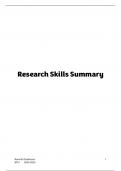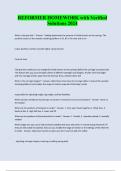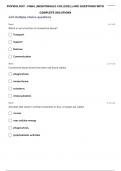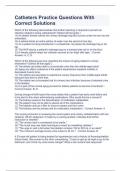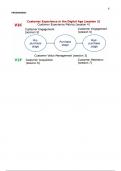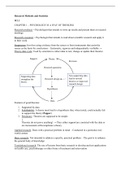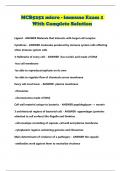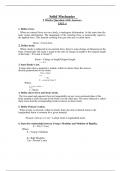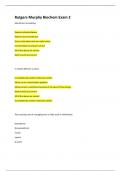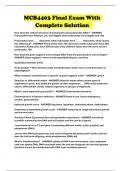Rania El Ghalbzouri 1
IBT 3 2024-2025
,Contents
Preface.................................................................................................................... 3
Lecture 1: Introduction ............................................................................................. 4
Lecture 2 ............................................................................................................... 15
Lecture 4 ............................................................................................................... 29
Lecture 6: .............................................................................................................. 38
Lecture 8: .............................................................................................................. 47
Lecture 11 ............................................................................................................. 50
Butterfly Model ...................................................................................................... 63
Exam Questions ..................................................................................................... 70
Rania El Ghalbzouri 2
IBT 3 2024-2025
,Preface
What should your methodology look like?
1. Simplicity: Design a straightforward approach that is easy to follow and implement.
2. Relevance: Focus on applying purposeful and logical methods rather than listing
unrelated methodologies.
3. Consistency: Maintain a consistent approach while anticipating potential
challenges.
4. Strategy: Make deliberate and strategic decisions to ensure the methodology aligns
with your objectives.
Key Principles for Personal and Professional Growth
Adopt a Growth Mindset
➢ A fixed mindset limits potential; even talent falters without adaptability.
➢ Embrace a growth-oriented perspective to unlock unlimited possibilities.
Dream Big, Act Small
➢ Dreams require actionable plans to succeed.
➢ Plans thrive when inspired by a clear, ambitious vision.
Break Goals into Steps
➢ Large goals can feel daunting.
➢ Dividing them into manageable steps makes progress achievable and sustainable.
Choose Mastery Over Perfection
➢ Perfection is unattainable and leads to frustration.
➢ Focus on consistent progress and excellence to master any skill.
Think Long-Term
➢ Consistency outperforms sporadic effort in the long run.
➢ Success depends on finding and maintaining a sustainable pace.
Rania El Ghalbzouri 3
IBT 3 2024-2025
,Lecture 1: Introduction
Defining Research Skills
Research skills encompass the ability to systematically gather, analyze, and interpret
information to address questions, solve problems, or make evidence-based decisions.
Key components include:
➢ Core Activities: Data analysis, critical thinking, information gathering, and problem-
solving through tools like interviews, surveys, and questionnaires.
➢ Academic Methods: Conducting literature reviews, using databases effectively, and
citing sources appropriately (Oliveira, 2016).
➢ Practical Applications: Tackling business challenges and driving evidence-based
decision-making.
➢ Broader Impact: Advancing societal progress, fostering business sustainability, and
enabling both professional development and personal growth.
Research skills are integral to innovation, continuous learning, and meaningful
contributions to diverse fields.
Importance of Research Skills in International Business and Trade
Research skills are critical for navigating the complexities of global markets and ensuring
sustainable business success. Key reasons include:
➢ Risk Assessment and Mitigation: Identifying potential risks and implementing
strategies to minimize them in volatile global environments.
➢ Continuous Improvement:Enhancing products, services, and business strategies
based on informed insights to maintain competitiveness.
➢ Adaptation to Global Markets: Understanding diverse cultural, economic, and
regulatory contexts to thrive in international settings.
➢ Sustainability and Profitability: Ensuring long-term success by balancing profit
goals with sustainable business practices.
➢ Understanding Market Dynamics: Analyzing market trends and consumer behavior
to make evidence-based decisions.
➢ Ethical and Legal Compliance: Conducting business responsibly to build trust and
avoid legal issues across jurisdictions.
➢ Effective Negotiation and Relationship Building: Using research to foster
partnerships and navigate complex trade negotiations.
➢ Competitive Advantage: Leveraging insights to innovate and grow, staying ahead in
a competitive global marketplace.
These skills empower businesses to make strategic decisions, foster resilience, and
succeed in international trade.
Rania El Ghalbzouri 4
IBT 3 2024-2025
,Wisdom
Wisdom is deeply rooted in intuition, acting as a compass in the vast complexity of "why"
questions in life.
Intuition as a Guide: A gut feeling or instinct shaped by personal experiences and an
understanding of the world.
Navigating Complexity: Intuition helps identify the key reason or solution in a sea of
possible explanations.
Wisdom in Action: It directs attention to what truly matters, enabling informed decisions
and deeper insights into situations.
The Infinite 'Why' Room Metaphor:
➢ Imagine an endless room filled with doors, each representing a possible reason or
explanation.
➢ Wisdom involves using intuition to identify the door that holds the key to
understanding or resolving a situation.
Application in Decision-Making:
➢ By focusing on what matters most, wisdom enables smart, impactful choices tailored
to the context.
➢ It ensures decisions are guided by significance and clarity, not overwhelmed by
infinite possibilities.
Deductive vs. Abductive Reasoning
Deductive Reasoning:
➢ A logical process based on syllogism, where conclusions are drawn from
established premises.
➢ Involves selecting the most appropriate alternative hypothesis that aligns with the
given premises.
➢ Example: If all A are B, and C is A, then C must be B.
Abductive Reasoning:
➢ A reasoning process that starts with an observed outcome and works backwards to
determine the cause or explanation.
➢ Relies on collecting and interpreting data to uncover significance and meaning.
➢ Example: Observing an effect and hypothesizing the most plausible cause (e.g.,
diagnosing an illness based on symptoms).
Both approaches are essential for problem-solving and decision-making, with deductive
reasoning focusing on logical derivation and abductive reasoning emphasizing
exploration and understanding of causes.
Rania El Ghalbzouri 5
IBT 3 2024-2025
, Plagiarism
Definition: Plagiarism involves using or presenting someone else’s ideas, data, results,
writings, or inventions without proper attribution (COPE Taxonomy, 2013). It is often
viewed as a form of fraud.
Etymology: The term "plagiarism" originates from the Latin plagiarius and Greek plagion,
meaning "kidnapping" or "kidnapper."
Self-Plagiarism: Self-plagiarism, or text recycling, occurs when an author reuses
sections of their own previous work without proper attribution (BioMed Central and
COPE, 2016). This is considered unethical, even if it involves the author’s own content.
Ethical Considerations: Both presenting others’ work as one’s own and recycling one's
own work without acknowledgment are considered unethical by publishers and editors.
While plagiarism does not necessarily involve legal copyright infringement, copyright
violations can accompany acts of plagiarism (Pierson, 2018).
Research Integrity and Research Misconduct
Researchers must rely on the integrity and honesty of their colleagues when describing
methodologies, recording analyses, and reporting findings. Research misconduct
undermines this trust and can severely impact the credibility of scientific work.
In 2000, the U.S. Office of Science and Technology Policy introduced the Federal Policy
on Research Misconduct, which defines misconduct in three key forms:
1. Fabrication: Creating false data or results and recording or reporting them as
genuine.
2. Falsification: Altering research materials, equipment, or processes, or changing or
omitting data so that the research does not accurately represent the original work.
3. Plagiarism: Using another person's ideas, processes, results, or words without
proper attribution (Israel, 2018).
Rania El Ghalbzouri 6
IBT 3 2024-2025

